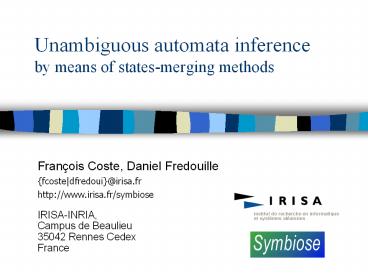Unambiguous automata inference by means of states-merging methods PowerPoint PPT Presentation
1 / 28
Title: Unambiguous automata inference by means of states-merging methods
1
Unambiguous automata inference by means of
states-merging methods
- François Coste, Daniel Fredouille
- fcostedfredoui_at_irisa.fr
- http//www.irisa.fr/symbiose
- IRISA-INRIA,
- Campus de Beaulieu
- 35042 Rennes Cedex
- France
2
Definitions
I- Automata inference
- Alphabet ? a,b
- Word abbabbabbaaa ?
- Language L
- Automaton
?
Labaab
3
Classes of automata (1/3)
I- Automata inference
- Nondeterministic Automata (NFA)
- Deterministic Automata (DFA)
- one outgoing transition per input symbol
Labaab
4
Classes of automata (2/3)
I- Automata inference
- Unambiguous Automata (UFA) SH85
- one acceptance per word
Labaab
- NFA ? UFA ? DFA
5
Automata inference
I- Automata inference
Examples
Counter-examples
Labaab
6
Why this study ?
I- Automata inference
- State of the art DFA inference
- Our goal introducing some amount of
non-determinism - Why ?
- NFA ltlt DFA
- inferring with less data
- inferring explicit representations
- Method
- extending classical DFA inference algorithm
7
II - Study of the DFA inference framework
8
Search space for NFAs DMV94
II - The DFA search space
UA
MCA
9
Counter-examples compatibility
II - The DFA search space
UA
(incompatible)
(compatible)
MCA
10
The search space for DFA
II - The DFA search space
11
Merging for determinisation procedure
II - The DFA search space
? q1,q2 ? Q, ? w ? ? w ? pref(q1) ? w ?
pref(q2) ? state-merging(q1,q2)
12
Merging for determinization procedure
II - The DFA search space
? q1,q2 ? Q, ? w ? ? w ? pref(q1) ? w ?
pref(q2) ? state-merging(q1,q2)
13
Merging for determinization procedure
II - The DFA search space
? q1,q2 ? Q, ? w ? ? w ? pref(q1) ? w ?
pref(q2) ? state-merging(q1,q2)
14
Deterministic merging operator
state-merging merging for determinization
II - The DFA search space
- Very commonly used OG92, LPP98,...
- Demonstration of formal properties
- Merging for determinization
- Enables to reach the closest DFA from the
original NFA - Deterministic merging
- Enables to reach all derived DFA from a given DFA
- ... (see tech. rep.)
15
IV - From DFA to UFA inference or how to
introduce some amount of non- determinism in
inference
16
Inferring non-deterministic representations the
choice of UFA
III - DFA to UFA inference
- Why UFA ?
- unity in the search space (like DFA)
UA
NFA
UFA
DFA
MCA(aaaaa)
17
Merging for disambiguisation procedure
III - DFA to UFA inference
? q1,q2 ? Q, ? w1,w2 ? ? w1 ? pref(q1) ? w1
? pref(q2) ? w2 ? suff(q1) ? w2 ? suff(q2) ?
state-merging(q1,q2)
18
Merging for disambiguisation procedure
III - DFA to UFA inference
? q1,q2 ? Q, ? w1,w2 ? ? w1 ? pref(q1) ? w1
? pref(q2) ? w2 ? suff(q1) ? w2 ? suff(q2) ?
state-merging(q1,q2)
19
Unambiguous merging state-merging merging
for disambiguisation
III - DFA to UFA inference
- Finer operator than merging for determinization
- Demonstration of formal properties
- Merging for disambiguisation
- Enables to reach the closest UFA from the
original NFA - unambiguous merging
- Enables to reach all derived UFA from a given UFA
- ... (see tech. rep.)
20
IV - Comparative experiments - Inference
algorithms - Benchmarks - Experimental results
21
Algorithms
IV - Comparative experiments
- UFA
- Hill-climbing heuristic
- DFA
- EDSM heuristic LPP98
- RFSA
- DeLeTe II DLT01
- Hill-climbing heuristic
22
Counter-example use for DFA and UFA inference
IV - Comparative experiments
- Compatibility DMV94
- generalization of , stopped by
- Functionality AS95
- generalization of and , stopped by
empty intersection
23
Benchmarks
IV - Comparative experiments
- DLT01
- Generation DFA, NFA, Regular Expression
- 4 sizes of training sample
- 30 languages generated for each generation mode
and sample size - UFA generator
- Evaluation based on
- average recognition level on test sets
- matches between recognition level
24
Results
IV - Comparative experiments
- Best algorithms w.r.t. benchmarks
- DFA bench UFA inference with hill-climbing
- UFA bench DFA inference with hill-climbing ?
UFA inference with hill-climbing - NFA bench RFSA inference
- Reg. Expr. RFSA inference ? DFA inference
with hill-climbing
25
Results
IV - Comparative experiments
- Heuristic
- Hill-climbing gtgt EDSM when inferring DFAs for
NFA/Regular Expression/UFA bench. - Counter-examples
- Compatibility ? Functionality
26
IV - Comparative experiments
Results (matches)
27
Conclusion
- UFA inference
- Merging for disambiguisation
- Heuristic
- Comparison with EDSM DeLeTe II
Perspectives
- Speeding up the algorithm
- Application
- Using properties of the DFA/UFA space
28
References
- AS95 Alquézar, Sanfeliu, Incremental
grammatical inference from positive and negative
data using unbiased finite state automata,
SSPR94 - DMV94 Dupont and al. What is the search space
of the regular inference ?, ICGI 94 - DLT00 Denis and al., Learning regular
languages using nondeterministic automata,
ICGI 00 - SH85 Stearns, Hunt, On the equivalence and
containment problems for unambiguous regular
expressions, regular grammars and finite
automata, SIAM vol 14 - tech. rep. Coste, Fredouille What is the
search space for NFA, UFA and DFA inference ?,
IRISA

